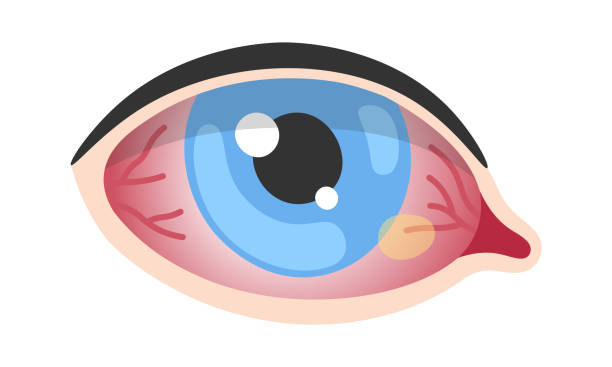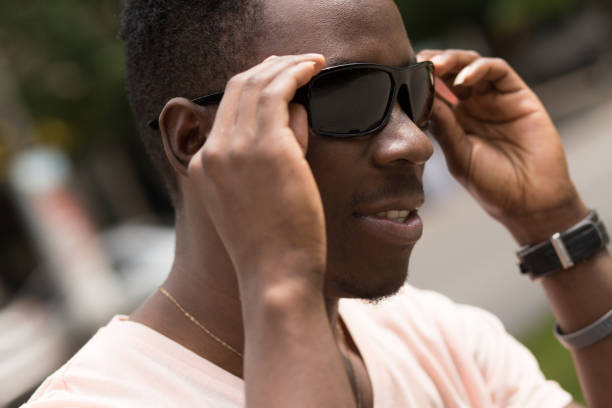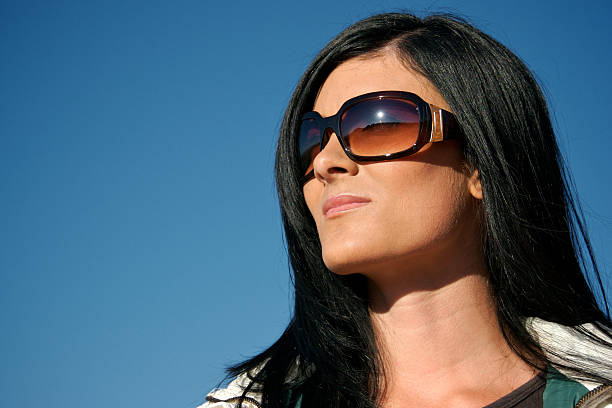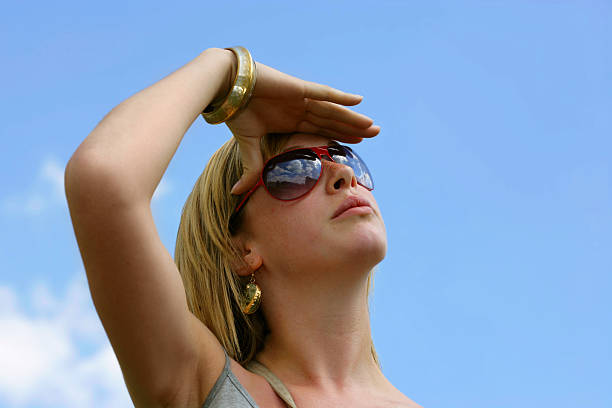Why UV Eye Protection Matters
Sunlight boosts your mood, helps your body make vitamin D, and keeps you awake and alert. But too much sun—especially UV rays—can be harmful to your eyes. UV (ultraviolet) light is invisible, but it’s very strong. Without proper protection, UV rays can slowly damage your eyes. And in many cases, that damage can’t be reversed.
Just like you protect your skin with sunscreen, you need to protect your eyes from UV exposure. It’s a simple step that makes a big difference. In this post, we’ll explore why UV eye protection matters, what risks come with unprotected eyes, and the easy ways you can shield your vision from harm.
What Are UV Rays?
Understanding Ultraviolet Light
UV rays, or ultraviolet rays, are a type of energy that comes from the sun. These rays are invisible but very powerful. There are three main types of UV rays you should know about:
- UVA: These rays go deep into your eyes and can cause long-term damage.
- UVB: These rays affect the surface of your eyes and can cause pain and burning.
- UVC: These rays are the strongest, but they are mostly blocked by the earth’s atmosphere.
Even though you can’t see UV rays, they can still harm your eyes. Too much exposure to UVA and UVB rays over time may lead to serious eye problems like cataracts or macular degeneration.

How UV Rays Harm Your Eyes
Too much exposure to UV light can hurt your eyes over time. When your eyes take in too many UV rays, it can lead to eye problems that cause pain, discomfort, or even vision loss. UV damage builds up slowly, so you may not notice it right away. But the risks are real. Here are some common eye issues linked to UV exposure:
1. Photokeratitis (Sunburn of the Eye)
Photokeratitis is like a sunburn—but it affects your eyes. It happens when your eyes take in too much UV light in a short time. This condition can cause pain, redness, tearing, and blurry vision. It’s common after spending time around snow, sand, or water, where the sun’s rays reflect into your eyes. Even a short time without protection can lead to this painful condition.
2. Cataracts
Cataracts happen when the lens of your eye becomes cloudy, making it hard to see clearly. UV rays can speed up the development of cataracts, especially with long-term exposure. This clouding of the lens can cause blurry vision, glare, and trouble seeing at night. According to the World Health Organization, up to 20% of cataracts may be caused by UV exposure【WHO UV and Eye Health】. Protecting your eyes from the sun can help lower this risk.
3. Macular Degeneration
Macular degeneration is an eye condition that affects your central vision. It can make it hard to read, drive, or recognize faces. Over time, this condition can lead to serious vision loss. Long-term exposure to UV rays may increase your risk of developing macular degeneration【NEI Macular Degeneration】. Wearing UV-protective eyewear can help protect your eyes and keep your vision sharp as you age.
4. Pterygium (Surfer’s Eye)
Pterygium, also known as surfer’s eye, is a pink, fleshy growth that forms on the white part of the eye. It can slowly grow toward the center of the eye and may affect your vision. This condition is common in people who spend a lot of time outdoors, especially in sunny, windy, or dusty places. UV exposure is a major cause, so wearing sunglasses with UV protection can help lower your risk.
Who Needs to Protect Their Eyes from UV?
Everyone needs UV eye protection, no matter their age or lifestyle. But some people are at even greater risk and should take extra care:
- Children: Kids’ eyes are still growing and let in more UV light than adult eyes.
- Outdoor Workers: People who work outside all day get steady sun exposure, which adds up over time.
- People at High Altitudes or in Snowy Areas: UV rays are stronger at higher altitudes, and snow can reflect sunlight into your eyes.
- Beachgoers and Swimmers: Water reflects UV rays, increasing your exposure even while you’re relaxing or having fun.
Remember, UV rays can still harm your eyes even on cloudy days or when you’re in the shade. That’s why daily eye protection is so important.

How to Protect Your Eyes from UV Damage
1. Wear Sunglasses with UV Protection
Not all sunglasses provide the same level of protection. When shopping for sunglasses, make sure to choose ones with these key features:
- 100% UVA and UVB Protection: Ensure the sunglasses block both types of harmful UV rays.
- Wrap-Around Style: This design helps block UV rays from hitting your eyes from the sides.
- Large Lenses: Bigger lenses provide more coverage, protecting a larger area of your eyes and surrounding skin.
Remember, the color or price of the sunglasses doesn’t always guarantee better protection. Darker lenses or high-end brands may not offer the full UV protection your eyes need. Always check the label!
Tip: Look for sunglasses marked “UV400.” This means the lenses block 100% of both UVA and UVB rays, offering the best protection for your eyes.
2. Add a Wide-Brimmed Hat
A wide-brimmed hat is an excellent way to protect your eyes from UV rays. It can block up to 50% of UV rays from reaching your eyes, especially when you’re outdoors. The brim also helps reduce glare, making it easier to see in bright sunlight. Choose a hat with a wide brim that shades your face, eyes, and neck for added protection. This simple addition to your outfit can make a big difference in preventing UV damage to your eyes.
3. Consider UV-Blocking Contact Lenses
Some contact lenses now offer built-in UV protection, which can help shield your eyes from harmful rays. While these lenses provide additional defense against UV light, it’s important to note that they don’t replace the need for sunglasses. UV-blocking contact lenses protect only the part of your eye they cover, but they don’t shield the delicate skin around your eyes. For full protection, pair UV-blocking contacts with sunglasses that offer complete UVA and UVB coverage.
4. Use Protective Eyewear for Sports
Sports like skiing, snowboarding, and water activities expose your eyes to higher levels of UV rays due to reflections off snow, water, and other surfaces. To protect your eyes, always wear protective eyewear, such as goggles or sports sunglasses that block harmful UV rays. These specialized lenses help reduce the risk of UV-related eye damage while also protecting your eyes from wind, dust, and debris. Don’t forget to check that your eyewear offers 100% UVA and UVB protection for the best defense.
5. Be Aware of Reflective Surfaces
UV rays can bounce off many surfaces, increasing your exposure. Common reflective surfaces include:
- Water
- Snow
- Sand
- Concrete
This reflection can double the amount of UV rays that reach your eyes, even when you’re in the shade. For example, if you’re sitting under an umbrella at the beach, UV rays reflecting off the water or sand can still find their way into your eyes. Always be aware of your surroundings and take extra precautions in reflective environments by wearing sunglasses or protective eyewear.
What About Everyday UV Exposure?
UV rays aren’t just a concern for beachgoers or mountain hikers. Everyday activities like walking your dog, driving, or sitting near a window can increase your exposure to harmful UV rays. Even on cloudy days, UV rays can still reach your eyes, adding to your total exposure.
Protect Your Eyes Daily:
- Wear sunglasses whenever you go outside, whether it’s sunny, cloudy, or raining.
- Keep a spare pair of sunglasses in your car or bag so you’re always prepared to protect your eyes.
- Check if your car’s windshield and windows have UV protection. Many modern cars come with built-in UV-blocking windows, but it’s always good to confirm.
By staying vigilant and protecting your eyes daily, you can reduce the long-term effects of UV exposure.
How to Choose the Right Sunglasses
When shopping for sunglasses, keep these tips in mind to make sure you’re getting the best UV protection for your eyes:
- ✔ Check the label: Always look for sunglasses that offer 100% UVA/UVB protection or are labeled UV400. This ensures full coverage against harmful rays.
- ✔ Go bigger: Choose larger frames or wrap-around styles for better coverage. The bigger the lens, the more protection it offers, especially from rays that come in from the sides.
- ✔ Don’t skip kids: Children’s eyes are more vulnerable to UV damage. Be sure to buy sunglasses that are specifically designed for kids and provide proper UV protection.
- ✔ Skip cheap knock-offs: Avoid sunglasses that don’t have a UV protection label, even if they look stylish. Cheap, unlabeled glasses might not protect your eyes at all and could even cause more harm.
By following these tips, you can ensure your sunglasses provide the best protection and keep your eyes safe from UV damage.
Can UV Damage Be Reversed?
Sadly, UV damage is usually permanent. Conditions like cataracts and macular degeneration may require surgery or long-term care. That’s why prevention is key. The sooner you start protecting your eyes, the better.
UV Eye Safety Tips at a Glance
Here’s a quick recap to keep your eyes safe:
- 🕶 Always wear sunglasses with 100% UV protection
- 👒 Add a hat for extra coverage
- 🌥 Wear eye protection even on cloudy days
- 🧒 Get sunglasses for your kids
- 🏄 Use sports-specific UV eyewear
- 🚘 Protect your eyes while driving or near windows
The Link Between UV Protection and Eye Health
Protecting your eyes from UV rays isn’t just about avoiding short-term discomfort. It’s about protecting your vision for life. By taking small steps every day, you can help lower your risk of eye diseases and enjoy clearer vision as you age.
Eye care experts like the American Academy of Ophthalmology stress the importance of UV protection as part of your regular eye health routine【AAO UV Eye Safety】.

Final Thoughts: Take Action Today to Protect Your Eyes
Your eyes are precious—and they’re with you for life. UV rays are invisible, but their damage is real. The good news? Protecting your eyes is easy and affordable.
Start today:
- Buy a pair of high-quality sunglasses
- Teach your kids the value of eye protection
- Make it a daily habit, not just something you do on vacation
What Do You Do to Keep Your Eyes Safe in the Sun?
We’d love to hear from you! Do you have a favorite brand of UV-blocking sunglasses? Have you noticed a difference since wearing eye protection? Drop a comment below and join the conversation!
Protect your vision—your eyes will thank you later.

